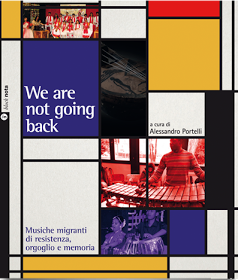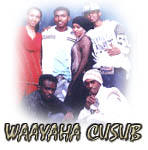Dhudhummada aan jaraa
Dhulkii hooyo iyo hilmihii aad dhashiyo waxaad dhaafsatay
(Continues)
(Continues)
Contributed by Dq82 2016/11/25 - 19:00
Song Itineraries:
The War of Labour: Emigration, Immigration, Exploitation, Slavery
Istaranyieri baan ahai

Artisti Vari - We are not going back (Nota, 2016)
In un articolo del novembre 2009 sulla rivista Internazionale, la scrittrice italo-somala Cristina Ali Farah parlava di Geedi, un giovane migrante somalo, allievo della scuola di italiano per stranieri Asinitas, che aveva scritto una canzone intitolata “Istaranyieri baan ahai”, sono straniero. Da tempo, nel Circolo Gianni Bosio (un’organizzazione romana indipendente di ricerca sulle culture popolari, la musica popolare, la storia orale) ci stavamo chiedendo se la musica dei migranti che ascoltavamo nelle strade, nei tram, nelle metropolitane di Roma, non fosse davvero la nuova musica popolare della città multietnica e multiculturale. La notizia su Geedi, insieme ad altri incontri avvenuti in quei giorni, ci convinse che si poteva fare. L’incontro con lui qualche tempo dopo grazie a Cristina Ali Farah fu l’inizio di un progetto che va avanti... (Continues)
In un articolo del novembre 2009 sulla rivista Internazionale, la scrittrice italo-somala Cristina Ali Farah parlava di Geedi, un giovane migrante somalo, allievo della scuola di italiano per stranieri Asinitas, che aveva scritto una canzone intitolata “Istaranyieri baan ahai”, sono straniero. Da tempo, nel Circolo Gianni Bosio (un’organizzazione romana indipendente di ricerca sulle culture popolari, la musica popolare, la storia orale) ci stavamo chiedendo se la musica dei migranti che ascoltavamo nelle strade, nei tram, nelle metropolitane di Roma, non fosse davvero la nuova musica popolare della città multietnica e multiculturale. La notizia su Geedi, insieme ad altri incontri avvenuti in quei giorni, ci convinse che si poteva fare. L’incontro con lui qualche tempo dopo grazie a Cristina Ali Farah fu l’inizio di un progetto che va avanti... (Continues)
Istaranyeeri baan ahayoo
(Continues)
(Continues)
Contributed by Dq82 2016/11/25 - 18:35
Song Itineraries:
The War of Labour: Emigration, Immigration, Exploitation, Slavery
Soomalaay dirira

Somali exiles use music to slam war
NAIROBI: Upon entering a tiny recording studio in a grimy Nairobi building, Felis removes her face veil, slides headphones onto her ears and starts singing in a high voice: “Girls are raped. Warlords are to blame”.
Over a soundtrack of world music and rap, Felis Abdi and the group Waayaha Cusub, made up of some 20 young Somali refugees, crudely slam the war that has torn up their country for 16 years, almost all their lives.
“All the people have been killed. Let us repair the country. There is no school, there is no peace,” sings Waayaha Cusub, which means “New Era” in Somali.
“People listen to you more when you sing than when you speak,” says Abdiwali Ibrahim Garyare, one of the group’s singers, who has lived in Kenya for 17 years.
“We can make a difference because the young generation listens to us,” adds 17-year-old Felis, who has a gap between... (Continues)
Soomalaay diriroo dagaalama
(Continues)
(Continues)
Contributed by Riccardo Venturi 2007/8/22 - 15:03
Dhib iyo qaxar

Somali exiles use music to slam war
NAIROBI: Upon entering a tiny recording studio in a grimy Nairobi building, Felis removes her face veil, slides headphones onto her ears and starts singing in a high voice: “Girls are raped. Warlords are to blame”.
Over a soundtrack of world music and rap, Felis Abdi and the group Waayaha Cusub, made up of some 20 young Somali refugees, crudely slam the war that has torn up their country for 16 years, almost all their lives.
“All the people have been killed. Let us repair the country. There is no school, there is no peace,” sings Waayaha Cusub, which means “New Era” in Somali.
“People listen to you more when you sing than when you speak,” says Abdiwali Ibrahim Garyare, one of the group’s singers, who has lived in Kenya for 17 years.
“We can make a difference because the young generation listens to us,” adds 17-year-old Felis, who has a gap between... (Continues)
Anigoon maryaha xiran aqoon oon martabad gaarin
(Continues)
(Continues)
Contributed by Riccardo Venturi 2007/8/22 - 15:01
Dadka yaa xasuuqay

Somali exiles use music to slam war
NAIROBI: Upon entering a tiny recording studio in a grimy Nairobi building, Felis removes her face veil, slides headphones onto her ears and starts singing in a high voice: “Girls are raped. Warlords are to blame”.
Over a soundtrack of world music and rap, Felis Abdi and the group Waayaha Cusub, made up of some 20 young Somali refugees, crudely slam the war that has torn up their country for 16 years, almost all their lives.
“All the people have been killed. Let us repair the country. There is no school, there is no peace,” sings Waayaha Cusub, which means “New Era” in Somali.
“People listen to you more when you sing than when you speak,” says Abdiwali Ibrahim Garyare, one of the group’s singers, who has lived in Kenya for 17 years.
“We can make a difference because the young generation listens to us,” adds 17-year-old Felis, who has a gap between... (Continues)
Dadka yaa xasuuqay
(Continues)
(Continues)
Contributed by Riccardo Venturi 2007/8/22 - 14:58
Waayaha Cusub

Somali exiles use music to slam war
NAIROBI: Upon entering a tiny recording studio in a grimy Nairobi building, Felis removes her face veil, slides headphones onto her ears and starts singing in a high voice: “Girls are raped. Warlords are to blame”.
Over a soundtrack of world music and rap, Felis Abdi and the group Waayaha Cusub, made up of some 20 young Somali refugees, crudely slam the war that has torn up their country for 16 years, almost all their lives.
“All the people have been killed. Let us repair the country. There is no school, there is no peace,” sings Waayaha Cusub, which means “New Era” in Somali.
“People listen to you more when you sing than when you speak,” says Abdiwali Ibrahim Garyare, one of the group’s singers, who has lived in Kenya for 17 years.
“We can make a difference because the young generation listens to us,” adds 17-year-old Felis, who has a gap between... (Continues)
Anoo baahidaaydiyo
(Continues)
(Continues)
Contributed by Riccardo Venturi 2007/8/19 - 21:26
×
![]()


Impronte digitali, frammenti significanti di essere umano. In un racconto di Cristiana Caldas Brito, scrittrice brasiliana che vive in Italia e scrive in italiano, si immagina che “cinquemila quattrocento ventidue polpastrelli, tutti imbrattati di inchiostro” si presentano un giorno alla Questura di Roma: “siamo entrati in questura in modo assolutamente pacifico e in ordinata fila, come si usa dalle nostre parti. Se proprio devo dire la verità, erano loro, i poliziotti, ad essere nervosi.... (Continues)